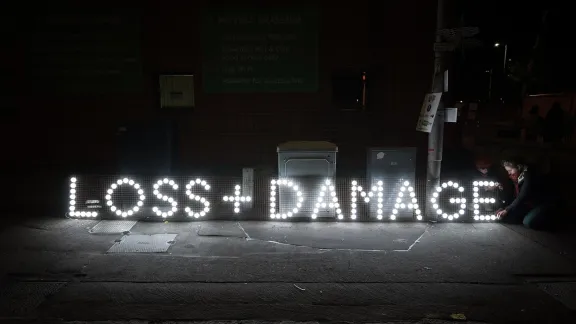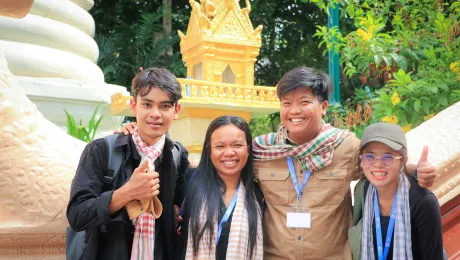LWF's main calls at COP27 focus on rapidly reducing greenhouse gas emissions, massively scaling up climate finance, making significant progress on climate adaptation, and creating a new mechanism to mitigate loss and damage from climate change.

Signs reading “Loss + Damage” outside the venue of COP26 in Glasgow, Scotland. Loss and Damage relate to how rich countries may help developing and poorer countries manage the impacts of climate change on peoples lives as the world needs to transition to build a sustainable future. Photo: LWF/Albin Hillert
Exploring LWF’s advocacy demands and engagement
(LWI) – The Lutheran World Federation (LWF) will raise its voice for those most affected by the climate crisis during the upcoming UN climate conference COP27 in Sharm el-Sheikh, Egypt. Climate change is disproportionately affecting the livelihoods of the poor and most vulnerable worldwide, especially those often faced with different forms of discrimination and marginalization, such as women in poverty, youth, children, people with disabilities, and indigenous people.
“A faith-based approach emphasizes the need to have compassion for all living things and the moral imperative to care for the Earth while protecting the lives, livelihoods, and dignity of communities vulnerable to climate change,” says Isaiah Toroitich, LWF’s Head of Global Advocacy. Since 2011, the LWF, its member churches and youth delegations have been at the forefront of this public witness at the COP meetings.
Young people play a vital role in the LWF’s efforts for climate justice and creation care. “Our contribution to and focus on intergenerational justice, with LWF youth leading our climate justice advocacy and implementing climate projects in their communities and churches, is a significant achievement,” Toroitich underlines.
Forty young delegates are joining other climate justice advocates at COP27 online, eight in person. They will be supported and accompanied staff from the communion office.
Expectations and policy demands for COP27
After extensive training in the past weeks, LWF’s delegates are well-prepared to engage in LWF’s advocacy at COP27.
“This year, our main calls focus on rapidly reducing greenhouse gas emissions, massively scaling up climate finance, making significant progress on climate adaptation, and creating a new mechanism to redress loss and damage from climate change,” explains Toroitich. “The time window to address these issues is closing fast: we may already reach 1.5 °C of global warming in the next five years.”
The term “climate change mitigation” means significantly reducing greenhouse gas emissions that cause global warming. Until now, the international community has not done enough to achieve the temperature goal of limiting global warming to 1.5°C. According to the Climate Action Tracker, the world is headed towards 2.1°C to 2.7°C warming compared to the pre-industrial global average temperature. “That would be a global disaster of an unknown scale,” says Toroitich.
Implementing measures to prevent this requires substantial finances. “Without fair climate finance, there is no basis of trust for successful negotiations at COP,” says Toroitich. Currently, climate finance is “completely inadequate.” In addition, states particularly vulnerable to climate change are internationally marginalized. The same applies to adaptation programs and compensation for losses and damage suffered by these states.
Therefore, the LWF calls on governments of industrialized countries to fulfill the collective finance pledge they made for 2020-2025: to provide USD 600 billion, making special provisions for climate adaptation measures.
Climate adaptation is the flip side of mitigation. If mitigation seeks to prevent the environment from changing, adaptation seeks to help people live in an already changed environment. “At the policy level, this means that climate risks must be mainstreamed and climate-resilient development pathways and livelihoods created,” Toroitich says. “What we want to see at COP27 is governments deciding on a roadmap to allocate 50 percent of climate finance to adaptation and providing more support to poor climate-vulnerable countries, enabling them to enhance their resilience.”
Climate-induced loss and damage refer to the consequences of climate change that go beyond what people can adapt to or when options exist, but a community does not have the resources to access or utilize them. “Finance is key to redress loss and damage,” explains Toroitich. “However, it has not yet been provided within the financial architecture of the Paris Agreement.” At COP27, the LWF calls on governments to establish a mechanism to address loss and damage and ensure a process to secure adequate, accessible, and additional financing.
The LWF participates in the 27th UN Climate Change Conference (COP27), which takes place in Sharm el-Sheikh, Egypt, from 6 to 18 November 2022. This engagement is part of the communion’s ongoing focus on strengthening climate action and advocacy at all levels. Young people are vital agents of change and form the greater part of the LWF’s delegation to COP27.


